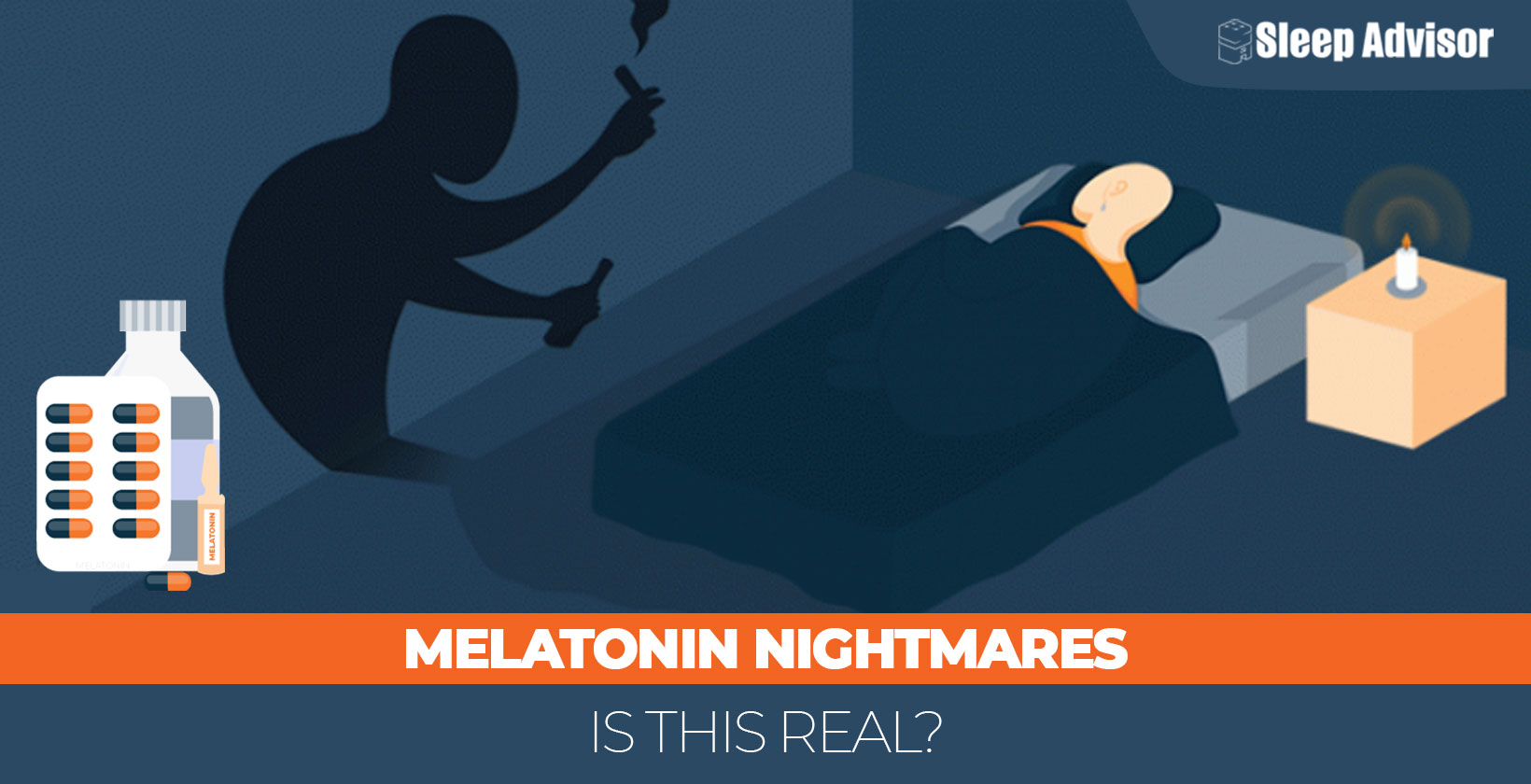Melatonin And Nightmares: The Surprising Connection You Need To Know
Have you ever wondered why melatonin, the supplement you take for a good night's sleep, sometimes turns your dreams into nightmares? Trust me, I was shocked too when I first heard about it. If you've been dealing with restless nights and bizarre dreams, you're not alone. Melatonin is one of the most popular sleep aids out there, but its relationship with nightmares can be a bit complicated. Let's dive into the science and see why this happens, shall we?
Before we get into the nitty-gritty, let's talk about what melatonin actually is. Melatonin is a hormone naturally produced by your body to regulate your sleep-wake cycle. It's like your body's internal clock, letting you know when it's time to wind down and catch some Z's. But sometimes, this hormone can play tricks on your mind, leading to vivid dreams or even nightmares. Ever felt like you were trapped in a horror movie while sleeping? Melatonin might just be the culprit.
Now, let's not jump to conclusions just yet. Melatonin isn't all bad. In fact, it's been a lifesaver for many people struggling with insomnia or jet lag. But like anything else, it comes with its own set of quirks. In this article, we'll explore the link between melatonin and nightmares, how it affects your dreams, and what you can do to mitigate the side effects. So grab a cup of tea, sit back, and let's unravel the mystery together.
- Edin Gaanin Vom Flchtling Zum Drogenboss Die Ganze Story
- Essstbchen Meistern Die Ultimative Anleitung Fr Anfnger
What is Melatonin and How Does It Work?
Melatonin is like the bandleader of your sleep orchestra. Produced by the pineal gland in your brain, it helps signal to your body that it's time to rest. When it gets dark outside, your melatonin levels naturally rise, preparing you for sleep. During the day, they drop, keeping you alert and awake. But what happens when we take melatonin supplements? Well, that's where things can get interesting.
Key Points:
- Melatonin is a hormone that regulates your sleep-wake cycle.
- It's naturally produced by your body, but supplements can help boost its effects.
- Supplements are often used to treat sleep disorders, jet lag, and shift work issues.
Now, here's the kicker—when you take melatonin supplements, your body might produce more than it needs. This can lead to heightened dream activity, which sometimes manifests as nightmares. It's like turning up the volume on your dreams, and not always in a good way. But don't worry, we'll explore how to manage this later on.
- Ramadan In Berlin 2025 Iftar Suhoor Zeiten Alles Was Sie Wissen Mssen
- Lewd Froggo Co Aktuelle Posts Insights Community
Why Does Melatonin Cause Nightmares?
So, why does melatonin sometimes turn your sweet dreams sour? The answer lies in how it affects your REM (Rapid Eye Movement) sleep. REM is the stage of sleep where most dreaming occurs. Melatonin can increase the intensity and vividness of your dreams, which is great if you're into lucid dreaming, but not so much if you're prone to nightmares.
Here's the science behind it:
- Melatonin enhances REM sleep, making dreams more vivid.
- For some people, this can lead to more intense and sometimes frightening dreams.
- Individual responses to melatonin can vary, so what affects one person might not affect another.
Think of it like this—if your dreams are like a movie, melatonin is like turning up the special effects. Sometimes those effects are awesome, but other times, they can be a bit scary. It all depends on your unique brain chemistry and how your body reacts to the supplement.
Who is Most Affected by Melatonin-Induced Nightmares?
Not everyone who takes melatonin will experience nightmares. Certain factors can make you more susceptible to this side effect. For instance, if you already have a predisposition to vivid dreams or anxiety, melatonin might amplify those tendencies. Let's break it down:
Factors That Increase the Risk:
- People with anxiety or stress disorders.
- Individuals who already experience frequent nightmares.
- Those who take higher doses of melatonin.
It's important to note that not all nightmares are created equal. Some might be mild and forgettable, while others can leave you feeling shaken. If you fall into any of the categories above, it might be worth reconsidering your melatonin dosage or exploring alternative sleep aids.
How to Manage Melatonin-Induced Nightmares
If you're experiencing nightmares after taking melatonin, don't despair. There are several strategies you can try to minimize this side effect. First and foremost, consider adjusting your dosage. Most experts recommend starting with a low dose, around 0.3 to 1 mg, and gradually increasing if needed.
Other Tips:
- Take melatonin at least 30 minutes before bed to allow it to kick in gradually.
- Avoid taking it too late at night, as it can disrupt your natural sleep cycle.
- Pair it with relaxation techniques like meditation or deep breathing to calm your mind.
Remember, your body is unique, so what works for one person might not work for another. It's all about finding the right balance for you.
Alternatives to Melatonin for Better Sleep
If melatonin isn't working for you, there are plenty of other options to explore. Natural remedies like chamomile tea, valerian root, and lavender essential oil can help promote relaxation and improve sleep quality. Lifestyle changes, such as maintaining a consistent sleep schedule and creating a calming bedtime routine, can also make a big difference.
Natural Sleep Aids:
- Chamomile tea: Known for its calming properties.
- Valerian root: Often used to reduce anxiety and improve sleep.
- Lavender essential oil: Helps create a peaceful sleep environment.
Don't forget the power of good sleep hygiene. Things like keeping your bedroom cool, dark, and quiet can go a long way in ensuring a restful night's sleep.
When to Consult a Doctor
While occasional nightmares are usually nothing to worry about, persistent or severe nightmares could be a sign of an underlying issue. If you're experiencing frequent nightmares that disrupt your sleep or affect your daily life, it might be time to seek professional help. A healthcare provider can help determine if there's a deeper cause and recommend appropriate treatment options.
Signs You Should See a Doctor:
- Nightmares occur multiple times a week.
- They cause significant distress or anxiety.
- They interfere with your ability to function during the day.
Don't hesitate to reach out for help if you need it. Your mental and physical health are worth it.
The Role of Stress and Anxiety in Nightmares
Stress and anxiety can play a big role in the frequency and intensity of your nightmares. If you're dealing with a lot of stress in your life, it can manifest in your dreams, making them more vivid and sometimes frightening. This is where melatonin can sometimes exacerbate the problem, amplifying the effects of stress on your sleep.
Ways to Reduce Stress:
- Practice mindfulness or meditation.
- Engage in regular physical activity.
- Seek support from friends, family, or a therapist.
Managing stress can go a long way in improving your sleep quality and reducing nightmare occurrences. It's all about finding what works best for you and making it a regular part of your routine.
Understanding the Science Behind Nightmares
Let's take a deeper dive into the science behind nightmares. While melatonin can certainly play a role, it's not the only factor at play. Nightmares can be triggered by a variety of things, including medications, substance use, and even certain foods. Understanding the root cause can help you better manage them.
Common Nightmare Triggers:
- Certain medications, such as antidepressants.
- Alcohol or drug use.
- Heavy meals before bed.
By identifying and addressing these triggers, you can take steps to reduce the frequency and intensity of your nightmares. It's all about being proactive and taking control of your sleep health.
Conclusion: Finding Balance in Your Sleep Routine
Melatonin can be a powerful tool in your sleep arsenal, but it's not without its quirks. If you're experiencing melatonin-induced nightmares, don't give up hope. There are plenty of strategies you can try to mitigate this side effect and improve your overall sleep quality. From adjusting your dosage to exploring alternative sleep aids, the key is finding what works best for you.
Remember: Your sleep is important, and so is your mental well-being. If you're struggling with nightmares or other sleep issues, don't hesitate to seek help. Whether it's talking to a healthcare provider or making lifestyle changes, taking action can make a world of difference.
So, the next time you reach for that melatonin supplement, take a moment to consider how it might affect your dreams. And if you need a little extra support, there's no shame in reaching out for help. Sweet dreams, everyone!
Table of Contents
- What is Melatonin and How Does It Work?
- Why Does Melatonin Cause Nightmares?
- Who is Most Affected by Melatonin-Induced Nightmares?
- How to Manage Melatonin-Induced Nightmares
- Alternatives to Melatonin for Better Sleep
- When to Consult a Doctor
- The Role of Stress and Anxiety in Nightmares
- Understanding the Science Behind Nightmares
- Conclusion: Finding Balance in Your Sleep Routine
- Reis Kochen Leicht Gemacht Tipps Tricks Fr Perfekte Ergebnisse
- Haben Sie Das Gesucht Tipps Zur Suche Nach Serien Filmen

Can Melatonin Cause Nightmares? (2024) Sleep Advisor

Stream Melatonin Nightmares by Swollen Eye Listen online for free on

Do Melatonin Dreams and Melatonin Nightmares Really Occur